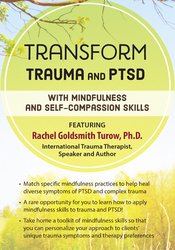

The multitude of difficulties stemming from trauma - emotional, cognitive, physical, spiritual, and relational-can overwhelm both trauma survivors and you as their clinician. You face a unique constellation of challenges with each client. Luckily, mindfulness practices can provide bountiful avenues towards trauma recovery and posttraumatic growth. Mindfulness skills offer an ideal synthesis of focusing on the “here and now” and healing layers of trauma-related distress. Using specific mindfulness techniques, you can target each client’s unique symptom profile to reduce experiences such as:
Beyond decreasing symptoms of trauma and PTSD, mindfulness skills can provide a lasting foundation for overall health, resilience, and well-being.
Join Dr. Turow, author of Mindfulness Skills for Trauma and PTSD: Practices for Recovery and Resilience (Norton Professional Books, 2017), as she distills her clinical and research expertise to pinpoint specific mindfulness techniques for common responses to trauma. By implementing these skills in your practice, you can confidently guide traumatized clients to tolerate and transform distress, promote bodily relaxation, and shift self-criticism to self-compassion.
This online program is worth 6.25 hours CPD.
| File type | File name | Number of pages | |
|---|---|---|---|
| Manual (1.10 MB) | 59 Pages | Available after Purchase |
Rachel Goldsmith Turow, Ph.D., is a clinical psychologist, research scientist, and adjunct faculty member at Seattle University and the Icahn School of Medicine at Mount Sinai. In her clinical work, she has provided a range of treatments for trauma and related challenges, including “Self-Talk” therapy groups that integrate lovingkindness meditation and cognitive behavioral skills to transform self-criticism into self-encouragement. Dr. Turow’s research program addresses the ways that emotion regulation, self-compassion, trauma appraisals, and social contexts influence trauma recovery. As a faculty member of Rush University Medical Center, Dr. Turow started the hospital’s Dialectical Behavior Therapy-based program, supervised psychology and medical trainees, and trained military medical personnel to manage others’ trauma responses during deployment.
Dr. Turow has written dozens of scientific articles and chapters, along with the book Mindfulness Skills for Trauma and PTSD: Practices for Recovery and Resilience. She is a reviewer for several professional journals and serves on the Scientific Advisory Board for the International Society for the Study of Trauma and Dissociation.
Speaker Disclosures:
Financial: Rachel Goldsmith Turow is an adjunct faculty at Seattle University. She receives a speaking honorarium from PESI, Inc. She has no relevant financial relationships with ineligible organizations.
Non-financial: Rachel Goldsmith Turow has no relevant non-financial relationship to disclose.
| 5 |
|
| 4 |
|
| 3 |
|
| 2 |
|
| 1 |
|
Satisfaction Guarantee
Your satisfaction is our goal and our guarantee. Concerns should be addressed to info@pesi.co.uk or call 01235847393.
Please wait ...